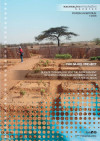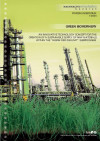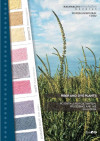Suchergebnisse
Market oriented sustainable ROI-Contracting
Concept for launching of a new business unit or an independent ROI-Contracting Consulting with effects on sustainable development.
Colors of Nature - vegetable dyes in practice
By means of optimization of the production of vegetable dyes and dyeing technology, the vegetable dyestuff "Colors of Nature" will achieve market maturity. In co-operation with farmers and companies of the textile, food processing and wood working industry there has been developed a competitive product throughout the value chain, which will not only yield an ecological advantage, but also generate regional creation of value.
Industrially produced residential dwellings

Potential of future development for industrially produced residential dwellings Enquiry on international tendencies in automated manufacturing and assessment of viable strategies for their implementation into the Austrian building sector
Transition to sustainable production systems
The project aims to provide the basis for a transition strategy towards the establishment of sustainability-orientated production and consumption systems. Together with participants and addressees of the programme "Factory of the Future", the project will develop a common framework for the management of transition processes.
The Sahel Project

Silicate technology for the improvement of water uptake and nutrient storage in marginal soils
Forschungsforum
1/2006
Herausgeber: BMVIT
Englisch, 6 Seiten
Downloads zur Publikation
Green Biorefinery

An innovative Technology Concept for the Creation of a Sustainable Supply of Raw Materials within the "Fabrik der Zukunft" Subprogram
Forschungsforum
1/2004
Herausgeber: BMVIT
Englisch, 6 Seiten
Downloads zur Publikation
Fiber And Dye Plants

Potentials for Cultivation, Processing, and Use in Austria
Forschungsforum
1/2002
Herausgeber: BMVIT
Englisch, 6 Seiten
Downloads zur Publikation
RTI strategy for the bio-based industries in Austria

Sustainable industrial concepts will assume a key role in the future. At the European level, the development of bio-based industries and the use of bio-based products will be promoted.
Material utilization of end-of-term textiles
Mechanical processing of the non-reusable part of collected end-of-life apparels (e.g. cutting, sifting, etc.); development of marketable application for the obtained short fibers in the field of construction materials (e.g. bitumen modification)
Delphi Report Austria

Future-oriented approaches to the long-term comptitiveness an locational quality of Austria
Forschungsforum
4/1998
Herausgeber: BMVIT
Englisch, 6 Seiten
Downloads zur Publikation
Secondary Materials in the Austrian Textile Industry - Study with Recommendations for the Austrian R&D-Politics
This study deals with the challenges and potentials for the use of secondary materials in the Austrian textile industry. It identifies challenges and potentials for establishing cycles in the textile industry with a focus on the use of secondary materials in Austria based on broad stakeholder involvement. Based on this, recommendations for research and development activities were formulated to promote recycling.
Insulation material made of cattail
Development of the production technology for cattail insulating materials. Basis study to the feasibility of a serial production.
Bio-based substitution of fossil raw materials and products
To support the bio-based substitution of fossil raw materials and products, the fossil material flows in Austria for the reference year 2015 were collected and analysed. Furthermore, a broad bio-based technology research was part of the present study.
Fibre composites with natural adhesive
Developing of suitable bonding agents, fibres and processing technologies for the production of form stable fibre composites made of natural components. Production of prototypes like boards and moulded parts. Material testing.
Reduction of Broke in Paper Production
Development of a measurement and control system that detects paper deformation during production. Thus, broke is reduced, significant savings in energy use are achieved, and the economic efficiency is well increased.
Wood Plastic Composite - Direct extrusion
Development of a wood composite direct dosing system
The Paper Factory in the Year 2030
Paper factory in the year 2030 as an integrated part of a sustainable economy and a supplier of sustainable paper products fulfilling criteria for sustainability at highest possible level.
"Green Biorefinery - Utilitsation of Grass Fibres"
Basic properties of grass fibres from a green biorefinery will be investigated in order to have a sound base for comparison of grass fibres with other renewable fibres. Selected prototype-products with these grass fibres as main raw material source (e.g. insulation materials, gardening material, animal nutrition) will be developed, tested and evaluated whether they are technologically as well as economically feasible.
Knowledge based determination of plant species
Pollen for medical applications can be sorted by special machines. An integrated database and a spectrometric calibration allow a precise separation of the species with an identification of the plant species.
ZERIA 3 (Zero Emissions Research in Application)
Elaboration of the principles for zero emission enterprises. The results show that this approach can be realistic and economically advantageous in many cases.
